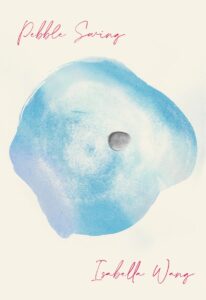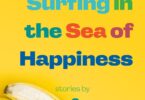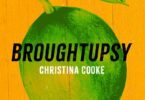 Reviewed by Manahil Bandukwala
Reviewed by Manahil Bandukwala
Isabella Wang, Pebble Swing (Harbour Publishing, 2021), 112 pp., $18.95.
In her debut collection Pebble Swing, Isabella Wang writes with remarkable and lyrical skill that echoes the influences of literary forebearers such as Li Bai and Phyllis Webb. The poems span across mother tongues, metaphorical language, and immigrant movement across bodies of water. Throughout the collection, Wang uses images of flowers like plum blossoms and sunflowers to write magical poems that transport the reader into her world.
Although the book opens with poems that walk through winter, Wang infuses spring into the cold beginning of the year. In “Elegy for Winter” she writes, “I want to be the invitation / that conducts inches of the sky’s / infinitesimal flowers to us each year,” likening snowflakes to falling petals with vivid beauty. The image of falling petals returns in a later poem, “Springtime Ghazals,” where Wang describes how “Time falls in gradients down the hourglass / …The mechanic heartbeat / of a petal falling.”
In the book’s titular poem, Wang writes to poet Natalie Lim: “They say, / Go back / to where you are from. / But Natalie, I’ve lost that deeper / pronunciation in my voice to find my way back.” These lines echo an earlier poem, “On Forgetting a Language,” which was also the title of Wang’s debut chapbook, published by Baseline Press in 2019. Wang writes: “If I return to my birthplace, Jining, now / I will return as a foreigner.” These poems speak to the way forgetting one’s language or cultural roots are involuntary and forced processes. When faced with the racist language of “go back to where you are from,” there is nowhere to return to. All that is left is “the anchorage of sadness / in a night’s dream.”
The way Wang writes the grief involved in the memory of home and family is evocative and heartbreaking. She recalls early childhood memories from China, memories that are fragmented and infused into present-day walks through Vancouver. In “I Remember,” she writes, “And the story of one / of Li Bai’s poems / on the other side of translation // that once there forgot its roots and mother tongue / and the fact that it had prior origins at all.” Against the forgetting that takes place after migration and translation, there is a determination to confront the stumbling involved in relearning a language. For example, in “Springtime Ghazals,” Wang writes: “I practice blotching my first ink characters / in Chinese, turning ripples into tears.” Towards the second half of the book, she writes a line in Farsi in “Thirteen Anti-Ghazals for Phyllis Webb,” signaling to the determination to not only relearn a forgotten language, but to also incorporate the learning of a new one into her study of ghazals.
One of the strongest aspects of this collection are Wang’s ghazals. Ghazals feature at least five couplets, and thematically engage with loss, pain, and beauty through abstract imagery. Wang demonstrates her study of Persian and Urdu ghazals through her couplets that appear autonomous yet are interconnected not only within individual poems but throughout the collection. Some of her ghazals are closer to the Urdu form, with their use of radifs (the repeating word at the end of the second line of each couplet), and appear in the first section of the book. From there, Wang slowly moves from Persian and Urdu ghazals forms into English while still maintaining the poetic essence of the ghazal form.
In “Thirteen Anti-Ghazals for Phyllis Webb,” she directly references the seemingly elusive manner of writing ghazals couplets, writing about “Sixty-two couplets at sundown / and sixty-two variations of the same couplet.” The image of rain falling and a disappearing sun reoccur throughout the collection, which draws a connection between the very first winter poem to the book’s sunny closing.
Pebble Swing ends with a love poem, “Serenade No. 1 in Sunflowers,” where “the sunset you and I have created from blooms.” Wang calls to spread the flower petals scattered across the pages to the wind, to let beauty fly in the world. She writes with tenderness how “one doesn’t have to be made of glass to let light in.” Instead of plum blossoms, the flower Wang returns to across many of her ghazals, this poem features sunflowers. The reason for this is given in the last few lines: “Because the word because is a beautiful word / you once used to explain to me why sunflowers are your favourite flower.” The word “because” is a riff in this poem that culminates in a moment where the tenderness and beauty of love shine through.
Pebble Swing is an exceptional read. Wang draws on both personal family histories and Canadian poetic traditions, resulting in beautifully crafted poems that are in conversation with each other and with literary forebearers from around the world.
…
 Manahil Bandukwala is a visual artist and writer. Her most recent forthcoming work is a collaborative piece with Liam Burke titled Orbital Cultivation, and is out with Collusion Books in 2021. She is Coordinating Editor for Arc Poetry, and Digital Content Editor for Canthius. She is a member of VII, an Ottawa-based creative writing collective. Her debut poetry collection is forthcoming with Brick Books in 2022. See her work at manahilbandukwala.com.
Manahil Bandukwala is a visual artist and writer. Her most recent forthcoming work is a collaborative piece with Liam Burke titled Orbital Cultivation, and is out with Collusion Books in 2021. She is Coordinating Editor for Arc Poetry, and Digital Content Editor for Canthius. She is a member of VII, an Ottawa-based creative writing collective. Her debut poetry collection is forthcoming with Brick Books in 2022. See her work at manahilbandukwala.com.






